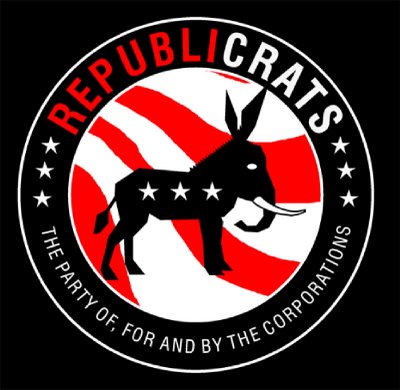In a post on '
understanding ideology' at American Power, Donal Douglas relays a graph from
Conservative Resources depicting the left-right ideological axis from communism to fascism:

Douglas writes: "I teach ideology, and most textbooks in comparative politics include some version of the graphs above.
" What caught my eye in this particular diagram was the duplication of 'anarchism' at both ends of the spectrum, directly preceding each of its extremes and literally interrupting the straight line from the center to the left and right with a bracket or brace. How can we make sense of this ambiguity?
Though many if not most self-described anarchists in the US today may undoubtedly be considered part of the political left, the ideology of anarchism is nonetheless difficult to categorize politically because it is both anti-capitalist and anti-statist. For instance, anarchists are in agreement with libertarians insofar as opposition to the state is concerned, but they part company on the issue of
free market capitalism. On the other hand, opposition to capitalism puts anarchists in agreement with Marxists, but the Marxist goal of seizing state power and implementing a '
dictatorship of the proletariat' is incompatible with the anarchist's anti-statism. This antinomy can be traced through the history of anarchist thought, and is perhaps best represented by the distinction between individualist and collectivist anarchism, symbolized, respectively, by
Max Stirner and
Mikhail Bakunin in the European context as well as
Henry David Thoreau and
Emma Goldman in the American tradition.
As an ideological formation, anarchism is strictly at odds with the duopoly system of government if only because it is at odds with all systems of government. With respect to the duopoly, principled anarchists would necessarily oppose the Republican and Democratic

Parties as the representatives of both the state and corporatist interests; and would view the two-party system as the means by which this power structure is maintained. It is thus no surprise that anarchism is for the most part incomprehensible to ideologues of the duopoly: conservatives see anarchists as violent socialists, while liberals view them as libertarian vandals. The figure of 'the anarchist' thus functions as a kind of
ideological Rorschach test, onto which both conservatives and liberals, Republicans and Democrats, project their image of the political other, mediating their respective relations to the extremes on both the left and the right.
Though each misunderstands anarchism in a different way, they both nonetheless agree in their association of anarchism with violence. It is worth noting, however, that anarchists are just as likely to espouse non-violence as they are direct action, while some have adapted the practice of
non-violent direct action. Whether violent or otherwise, American anarchists have nonetheless been consistent in their opposition to the two-party state over the last twenty or so years, as evidenced outside the
WTO meetings in Seattle during the Clinton administration and in the protests surrounding the
Republican National Convention in 2008. In 'the anarchist,' the duopoly parties thus rightly perceive a common enemy.











